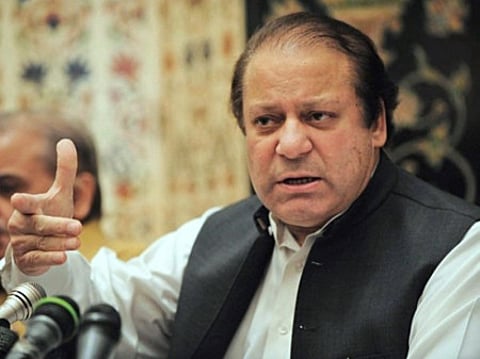Pakistan’s questionable ‘good news’
As the PM and ruling politicians pursue high-profile ventures in the name of development, they must be mindful of being exposed to charges of lack of transparency

Armed with their typical boyish smiles when gifted with a brand new toy, Pakistan’s Prime Minister Nawaz Sharif and a small group of his political followers on Thursday boarded a fancy new bus in Islamabad, which policymakers claimed could herald a new era of prosperity. The inaugural journey of the high-profile initiative marks the latest in a series of steps to lift Pakistan’s economic condition at a time when evidence of malaise across the country remains widespread.
But hours later came a reality check. Though accountant-turned-politician Finance Minister Ishaq Dar bravely announced that Pakistan’s latest growth rate for the financial year, which ended this month, had been higher than the previous year, he forgot to point out a vital detail. Growth in key sectors of Pakistan’s economy — namely agriculture, industry and services — has lagged behind target for the financial year, suggesting a degree of caution around the ‘all is well’ official claim. The only saving grace for Pakistan may well have been in the form of sharply reduced global oil prices that helped lower the import burden for a large number of oil importing countries including Pakistan.
Welcome to Sharif’s newly-emerging Pakistan, built on the back of fanciful flashy projects such as the Islamabad metro-bus service which will use Turkey-supplied buses to provide an air-conditioned service between the capital and its neighbouring city of Rawalpindi. However, the project, which costs just below $500 million (Dh1.83 billion) has attracted criticism and for good reason.
In a country where the ordinary public braves brutal gas shortages during the biting winter chill and extended electricity shortages throughout the year, including the scorching summer months, this is simply misplaced priority. For the community of poverty-stricken Pakistanis, it is much more vital to be given basic needs ranging from education and health care to the provision of fundamental utilities and eventually the hope for getting jobs.
For Sharif, however, the latest bus project is continuation of a long-running penchant for similar ventures undertaken in the name of modernisation and development. Before Sharif was elected Prime Minister for the third time in 2013, his younger brother Shahbaz Sharif oversaw a similar bus project in Lahore, the family’s political base. In the 1990s, Sharif’s first tenure as prime minister saw him lead the construction of a six-lane motorway linking Islamabad to Lahore, marking the first time that such an initiative was undertaken in Pakistan. However, the philosophy behind adding to Pakistan’s existing debt burden by borrowing more for such projects while neglecting other key areas remains questionable.
Though Sharif and his supporters argue that these projects have been undertaken in a transparent manner, circumstantial evidence says otherwise. Critics have argued that both bus projects were undertaken without an open and publicly verifiable bidding process for the choice of contractors right at the beginning — a fact that must raise questions over the way the builders of the projects were chosen.
Impoverished people
The debate over these projects has emerged at a time when Pakistan is locked in a continuing battle with Taliban militants. Scores of Pakistanis have already laid down their lives in service to the country and scores more may well be sacrificed before peace arrives. In the meantime, the battle against militancy must be fought on multiple fronts. These range from the outright fight on the battlefield to initiatives to win the hearts and minds of those Pakistanis who may support hardliners.
For a country where some estimates suggest that the number of impoverished people may well be one third of the population or roughly more than 65 million at the very least, tackling issues related to pressing daily needs must be central to the future of Pakistan’s stabilisation. At the same time, however, the complicated case of successfully fighting militancy was recently highlighted when three former university graduates were arrested in Karachi in connection with high-profile terrorist attacks. All reportedly belong to middle-income families — a far cry from the impoverished lot who will be drawn to embrace hardline causes.
There are no easy answers to the many intriguing questions surrounding the matter of exactly what fuels militancy. But they do beg to challenge Pakistan’s present direction in more ways than one. While Sharif adopts a so-called ‘business-friendly’ model to shape Pakistan’s destiny, the country is in fact in need of a true ‘people-friendly’ approach. The change must be built upon two equally compelling factors, each as vital as the other.
Urgent need
On the one hand, in sharp contrast to concentrating on high-profile signature projects there is an urgent need to identify areas of need for priority action. Anecdotal evidence shows a vast number of Pakistanis — though armed with school certificates and college degrees — nevertheless remain jobless. Meeting their needs will come about through a fresh economic philosophy, which tackles fundamental deficiencies at the grass-roots level. Ultimately, there is an urgent need to take decisive action where it matters the most — notably by filling the gaps in health care services, education and, last but not least, employment.
On the other hand, tackling corruption is important for political, economic and social stability. As Sharif and Pakistan’s ruling politicians pursue high-profile ventures in the name of development, they must remain mindful of becoming exposed to charges of lack of transparency surrounding major contracts.
Ultimately, however, the bottom line must always be remembered. The new buses plying through neighbourhoods immersed in darkness, owing to Pakistan’s energy crisis, will hardly make a contribution towards uplifting the country’s prospects. And that is in sharp contrast to the message from the prime minister and his supporters.
Farhan Bokhari is a Pakistan-based commentator who writes on political and economic matters.


